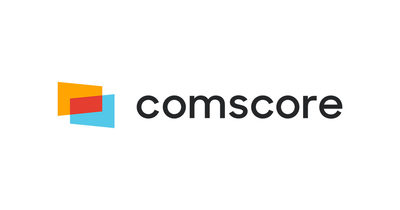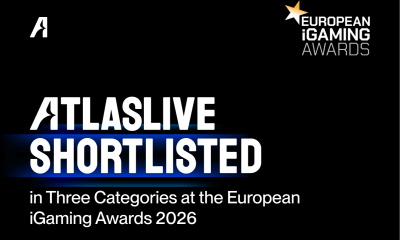Canada
Comscore Captures Remarkable Shifts in Esports, Gaming and Livestreaming Behaviors with 2020 ‘State of Gaming’ Report

In 2020, there have been remarkable shifts in esports, gaming and livestreaming behaviors. That is why Comscore (Nasdaq: SCOR), a trusted partner for planning, transacting and evaluating media across platforms, is thrilled to release its in-depth 2020 State of Gaming report.
Drawing from in-depth 2020 survey data and Comscore’s massive behavioral dataset, Comscore’s 2020 State of Gaming report examines the behaviors, sentiment, attitudes, and preferences of gaming audiences, the impact of COVD-19 and the emerging categories in esports, livestreaming, cloud gaming and more. The report includes over 80 pages of insights, to help advertisers and their agencies better understand the gamer segment, how game advertising and product placement are seen by gamers, and where there are opportunities to leave an impression and connect with gaming audiences.
Key insights include:
- The online gaming landscape encompasses millions of homes and devices. In May 2020, there were 210 million total unique visitors to the gaming category. In that same month, 38 million U.S. households had a gaming console, up nine million households from May 2019.
- Mobile-only gamers, a more casual segment of gamers, make up just 15 percent of all gamers, while 36 percent of gamers regularly play on PC, console, and mobile. More than 1 in 3 gamers play on every platform (desktop, mobile, console).
- While traditional sports were paused during the COVD-19 pandemic, esports online visitation gained traction. As of April 2020, 25 percent of gamers had watched esports in the past three months.
- Less than 1 in 3 gamers say advertisements negatively impact their gaming experience. In fact, 31 percent of console gamers believe product placement makes games more real and 48 percent of all gamers would like to see more chances for rewarded ads in a day.
For more information and to purchase the full report, please visit https://www.comscore.com/Gaming2020.
About Comscore:
Comscore (NASDAQ: SCOR) is a trusted partner for planning, transacting and evaluating media across platforms. With a data footprint that combines digital, linear TV, over-the-top and theatrical viewership intelligence with advanced audience insights, Comscore allows media buyers and sellers to quantify their multiscreen behavior and make business decisions with confidence. A proven leader in measuring digital and TV audiences and advertising at scale, Comscore is the industry’s emerging, third-party source for reliable and comprehensive cross-platform measurement. To learn more, visit www.comscore.com
SOURCE Comscore
Powered by WPeMatico
Canada
Group from Ts’elxwéyeqw Tribe and Great Canadian Entertainment Announce Agreement for the Acquisition of Elements Casino Chilliwack

Great Canadian Entertainment and a consortium group of certain communities from the Ts’elxwéyeqw Tribe, through an entity affiliated with Ts’elxwéyeqw Tribe Management Ltd. (the “Ts’elxwéyeqw Group”), announced that on November 7th, 2025, they entered into a definitive agreement for the purchase by the Ts’elxwéyeqw Group from Great Canadian Entertainment of Elements Casino Chilliwack, one of the premier gaming and entertainment destinations in the Fraser Valley region of British Columbia.
The Ts’elxwéyeqw Tribe constitute seven First Nation communities and are the First People of the Chilliwack River watershed. The transaction represents a transformational milestone for the communities within the Ts’elxwéyeqw Group.
Elements Casino Chilliwack serves guests across the Fraser Valley and is Chilliwack’s top destination for gaming and entertainment, featuring over 300 slots, live and electronic table games, bingo, dining, live entertainment and more.
The closing of the transaction remains subject to customary closing conditions and the receipt of regulatory and other approvals. Under the terms of the definitive agreement, Great Canadian Entertainment will continue to provide transitional services and support to the Ts’elxwéyeqw Group for a period following closing.
“This purchase marks an exciting milestone for our Nations and for the entire territory. By coming together in partnership, we are not only investing in a strong business opportunity, but also in the future of our people. The revenues generated through this acquisition will help strengthen our communities, create new opportunities, and ensure our Nations continue to play a leading role in the local economy. Additionally, we believe that local community-based ownership of Elements Casino Chilliwack will further strengthen the broader Fraser Valley community and economy. It’s a proud moment that reflects how Indigenous leadership and collaboration can build a stronger, more inclusive future for everyone,” said Chief David Jimmie, Chief of Squiala First Nation and President of Ts’elxwéyeqw Tribe Management Ltd.
“We are very excited to have entered into this agreement with the Ts’elxwéyeqw Group. We have had the privilege of being part of the Chilliwack community since we opened Elements Casino Chilliwack in 2012, and we believe that under the Ts’elxwéyeqw Group’s stewardship, the business will begin an exciting new chapter. For the team members and guests of Elements Casino Chilliwack, and the local community, we can think of no better owner for the business. We look forward to the closing and then working with the Ts’elxwéyeqw Group team during the transition period,” said Matt Anfinson, CEO of Great Canadian Entertainment.
McCarthy Tétrault LLP is acting as legal advisor and KPMG Corporate Finance Inc. is acting as financial advisor to the Ts’elxwéyeqw Group. McMillan LLP is acting as legal advisor to Great Canadian Entertainment.
The post Group from Ts’elxwéyeqw Tribe and Great Canadian Entertainment Announce Agreement for the Acquisition of Elements Casino Chilliwack appeared first on Americas iGaming & Sports Betting News.
BetVictor
Canadian iGaming Growth Trends 2025: Data, Strategy, and the Brands Defining the Market

Reading Time: 2 minutes
The Canadian iGaming market has evolved from an emerging opportunity into one of the most competitive and innovative digital gaming arenas worldwide. Ontario’s regulated framework has paved the way for rapid expansion, attracting established international operators alongside ambitious newcomers that are carving out share through brand differentiation and data-driven acquisition.
Methodology: How Growth Was Measured
To understand which casino brands are gaining momentum and why, the award-winning Mr. Gamble Casino Trends Meter—a proprietary performance index powered by Semrush, Ahrefs, in-house click tracking, market benchmarks, and predictive analytics—analyzed year-over-year (YoY) performance from January–June 2024 versus January–June 2025. The results point to a vibrant, fiercely competitive landscape where execution, trust, and experience are the real drivers of sustained growth.
Brands Showing Standout Growth in 2025
Strong outperformance highlights different paths to scale
Wild Tokyo posted an extraordinary +134% YoY, showing how bold branding, a distinctive identity, and targeted acquisition can resonate with players seeking unique experiences. Clean yet edgy design, paired with robust SEO execution and engagement programs, helped the brand cut through a crowded market.
LuckyDays delivered +110% YoY by striking a balance between simplicity and substance. A minimalistic UX, a vast game library, and strong affiliate relationships have positioned it as a trusted destination for Canadian players.
BetVictor, a legacy operator with deep roots, recorded +107% YoY. Its evolution from traditional bookmaker to diversified iGaming powerhouse underscores how credibility and adaptability can translate into modern growth.
Agile mid-tier brands are also accelerating: SlotsMagic at +94% and Betibet at +88% demonstrate how focused SEO, analytics-led decision making, and smart promotional strategy can punch above weight.
Crypto-forward momentum and broader market depth
The joint rise of BetFury and SmokAce—both at +74%—signals growing acceptance of crypto and blockchain-based gaming among Canadian users, driven by transparency, fast payments, and a tech-forward ethos.
Meanwhile, Paripesa, Mond, and ComeOn maintained robust double-digit YoY growth, underscoring the market’s depth and diversity beyond a handful of headline names.
Market Maturity: Compliance, Trust, and UX Win
As more provinces explore regulated frameworks modeled on Ontario, competition is intensifying. The brands pulling ahead are those investing in compliance, transparency, and player satisfaction—prioritizing product quality and retention over short-term promotions.
“Players are becoming more selective, more informed, and more focused on trust,” says Paul Puolakka, CMO at Mr. Gamble. “We’re seeing a clear shift toward quality brands that prioritize experience, safety, and innovation—the ones achieving real, sustained growth.”
Puolakka adds: “Data doesn’t just tell us who’s growing—it shows us why. The operators succeeding in Canada are those that deeply understand their audience, use insights effectively, and build long-term value instead of chasing short-term hype.”
Trends Shaping the Next Phase of iGaming in Canada
- Branding + data-led acquisition let emerging brands challenge incumbents more effectively than ever.
- Crypto-friendly casinos are moving from niche to mainstream consideration for Canadian users.
- SEO, content strategy, and affiliate partnerships remain reliable, capital-efficient growth levers.
- Compliance, transparency, and UX are central to sustainable market share gains.
Looking Ahead
The fastest-growing casino brands capture more than impressive statistics—they reflect a market in transformation. With Wild Tokyo setting creative benchmarks and veterans like BetVictor and ComeOn proving that brand equity still matters, Canada’s iGaming sector is entering a phase defined by intelligent growth, regulatory maturity, and player empowerment.
As the industry continues to evolve, the Mr. Gamble Casino Trends Meter remains a useful compass for players, affiliates, and operators navigating this fast-changing landscape.
The post Canadian iGaming Growth Trends 2025: Data, Strategy, and the Brands Defining the Market appeared first on European Gaming Industry News.
Canada
Ezugi partners with PokerStars to further extend live casino game choice for players

Reading Time: 2 minutes
Ezugi, an innovative live dealer casino supplier known for pushing the boundaries of live gaming, retention, and distribution solutions, is proud to announce a new partnership with PokerStars, the world’s largest online poker site.
Through this partnership, PokerStars’ players in the UK and Ontario will gain access to Ezugi’s standout portfolio, including Revolution Roulette, Ultimate Roulette, Unlimited Blackjack and Lucky 7 online casino games.
PokerStars, launched in 2001, is one of the world’s leading online poker and casino brands and operates as part of Flutter Entertainment. It has grown to become the largest poker site globally, offering the widest selection of online games and hosting prestigious live tournaments.
Formed in 2012, Ezugi is a global live casino provider with a focus on meeting operator and player needs with best-of-breed localised content. The Ezugi games portfolio includes a wide range of live dealer games, many of which are unique. Ezugi became part of Evolution in 2018 and continues to build on its reputation for providing unique and innovative games and solutions for online casino and retail betting shop operators.
Gilad Ben-Ami, Chief Executive Officer at Ezugi, said: “PokerStars’ players already enjoy a wide range of live casino and online slot games from Evolution brands such as Evolution, NetEnt, Red Tiger and Big Time Gaming. Now Ezugi is delighted and honoured to add even more choice for PokerStars’ players with our own innovative games.”
Ben-Ami continued: “The release of Ezugi games to PokerStars clearly demonstrates the rich variety and innovative features of the Ezugi games portfolio. Ultimate Roulette is a unique multiplier Roulette that blends circus-themed fun and TV game show excitement; Revolution Roulette puts a unique spin on classic Roulette by adding special multiplier pockets to the wheel; Unlimited Blackjack allows an unlimited number of players to play at the table, while also featuring Auto-Split functionality and a choice of four side bets – Perfect Pairs, 21+3, Perfect 11 and Ten20; and Lucky 7 is a very popular game with its origins in the Indian subcontinent – a fast-paced, simple and exciting Hi-Lo card game.”
Ben-Ami concluded: “We are confident that PokerStars’ players will love playing these games and we look forward to adding more Ezugi titles for them in the future.”
The post Ezugi partners with PokerStars to further extend live casino game choice for players appeared first on European Gaming Industry News.
-

 Andrew Jackson5 days ago
Andrew Jackson5 days agoScientific Games Adds to Information and Security Management Certifications, Continues Setting Global Industry Gold Standard
-

 Eastern Europe5 days ago
Eastern Europe5 days agoHIGHLIGHT GAMES LIVE IN ROMANIA WITH FORTUNA ENTERTAINMENT GROUP
-

 Best Solutions for iGaming Industry in Romania 20255 days ago
Best Solutions for iGaming Industry in Romania 20255 days agoSoft2Bet Nominated for Best Solutions for iGaming Industry in Romania 2025
-

 Australia5 days ago
Australia5 days agoBetMakers Signs Multi-Year Agreement to Launch CrownBet
-

 Latest News5 days ago
Latest News5 days agoAtlaslive Shortlisted in Three Categories at the European iGaming Awards 2026
-

 Nasdaq:GLPI5 days ago
Nasdaq:GLPI5 days agoGaming and Leisure Properties Expands Board of Directors With Appointment of Michael Borofsky
-

 Latest News5 days ago
Latest News5 days agoHow RocketWisdom Turned From An Internal Activity Into a Marketing Case
-

 Nasdaq:GMGI5 days ago
Nasdaq:GMGI5 days agoGolden Matrix Group (NASDAQ: GMGI) Appoints Mr William Scott to Build on Success and Accelerate Growth











